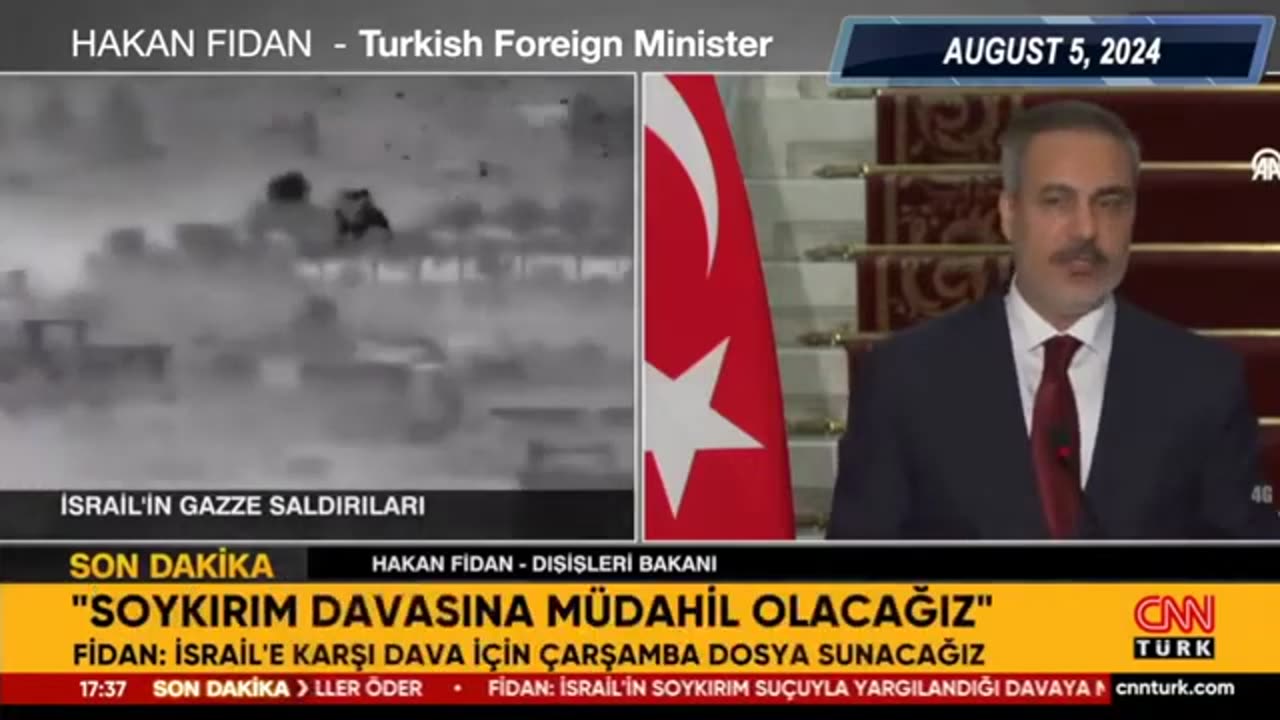Premium Only Content

Col. Douglas Macgregor : Is Israel On the Ropes? Judge Napolitano - Judging Freedom
https://www.youtube.com/watch?v=g_-WTBF_-Wc
Hi, everyone. Judge Andrew Napolitano here for Judging Freedom. Today is Thursday, August 8, 2024, 50 years since the day Richard Nixon resigned the presidency. Colonel Douglas McGregor joins us now. Colonel McGregor, a pleasure, my dear friend. Thank you for joining us. Not your usual day or time, but much appreciated. I want to spend a fair amount of time with you on the more recent events in and around Israel. But before we do, there is some relatively breaking news on the Ukraine front. What is your take on this invasion of Kursk by a supposedly crack or top team of Ukrainian soldiers? I think the Ukrainians received some good intelligence from us. Remember, we have space-based surveillance. We can see most everything most of the time, especially in Russia and Ukraine. I'm sure that we have our eyes on the frontline trace and also the Russian border. And they identified an area that was very, very weakly defended with only 30, 40, 50 policemen and said, this is an opportunity for you to storm across the border into an area where there's really nothing to stop you and demonstrate that you can penetrate into Russia itself. And this will create the illusion that there's still life left in the Ukrainian military and that everybody should contribute money to you. I think that's what happened. Interesting word, illusion. I mean, is there any military target that was attacked or military purpose served or is it just a PR stunt? Well, you call it a PR stunt, but some people were killed and some were wounded. I don't know precisely how many, so it was more than a PR stunt, but obviously when a thousand men come out of a forest and storm your position and you have 50 policemen to stop them, it's a rather short encounter. So I think the real purpose was, yes, to demonstrate what we said. We're still in the fight and we can do these things. The Russians have reacted not in a panic by any means. They reacted very deliberately, sending forces into the area. And I think this will result in a stiffening of border surveillance and security by the Russians. In reality, how weak does the Ukrainian military remain farther west where the Russians continue to decimate it? Well, we don't have exact numbers and they're difficult to come by right now, but I would be surprised if you have more than 100 or 150,000 troops left that can actually mount any kind of serious defense. There are certainly more than just 150,000 milling around. But remember, the country is being stripped out of whatever they can find for manpower. People are being shoved into uniform, handed a weapon, given a little bit of training, maybe a few days and sent forward. So it's literally an exercise in recruiting, forcibly recruiting cannon fodder. So Ukraine is really finished. Now people keep asking, well, then why don't the Russians move forward? And again, I've tried to explain this, that the Russians don't want a settlement which involves their governing Ukrainians. They control what's Russian right now. They still are interested in Kharkov and Odessa, Russian-speaking cities historically, but they really don't want to advance much further west because you're just taking over areas that are filled with hundreds of thousands of Ukrainians. And the Russians are stupid. They know the Russians are not welcome. They don't want to get into a fight there. They don't want to end up killing civilians to suppress them, which is what the Soviets did. So they'd rather end this on what they think are the terms that make sense, which is for them to retain control of what I just described. And we're not willing to do that. Zelensky said he won't do it, but I think he's going to be forced to before long. Is there any military significance to the arrival and ostentatious display of F-16s in Ukraine? No. There are so few F-16s involved. These are old airframes. I think they originated in Denmark. They have been updated with more contemporaneous electronics. They can certainly carry weapons. The thing that gives the Russians pause, and one of the reasons that initially President Biden said he would not provide modernized aircraft is very simply because they can carry nuclear weapons. And as I recall, President Biden said, if we were to do that, then we're marching in the direction of World War III, and that's something I don't want to do. Well, he's crossed that red line. Hopefully they don't have access to anything nuclear, as far as I know they don't. But that's the only thing that the Russians would be concerned about. The F-16s, they'll be acquired and they'll be targeted and shot down if they're used. Here's President Zelensky. I'm not sure what he's saying here, but he is showing off the F-16s. Cut number 12. I can't for today give you details with the missions. I think you will see, maybe not all of them, but you will see the results. We will decide to comment if it was the result with F-16 or not. It's not, I mean, it's not the moment for this. I think it's very dangerous for today. We need to do all the security measures which have been discussed with our partners about using F-16. They really have no military, don't they? About 40 years old? Yes, the airframes originated at least three to four decades ago. It's a giant Potemkin village. That's what Ukraine has become. It's a facade. There's not much behind it anymore except suffering people in Ukraine. And then you get these utterly false polls coming out talking about how everybody supports Zelensky. That's just not true. The population there is sick of this, desperately wants an end to the fighting. So this is over except for the facade that we crop up with lots and lots and lots of cash. How else could Mrs. Zelensky drive around in a Bugatti? Wow. I would imagine that none of this will change at least for the next 90 days, that is until after November 5th, which is the American presidential election. Do you think the State Department recognizes the decrepit state of Ukraine military and its impending demise? Sure, behind the scenes, I think people have finally come to terms with reality. They're no longer drinking their own Kool-Aid the way they did months ago. And, you know, Zelensky and his wife just purchased a magnificent winery in Tuscany. So now that they own that and they own the village that goes with it, they have a place to go to relatively quickly. So I would think he knows that things are ending. And when it gets close to total disaster, he'll pack it in and leave, which is we saw people leave Afghanistan, as we saw generals and other people, Iraqi generals leaving with suitcases of cash from Iraq into Jordan and Kuwait. It's the same thing. Switching gears, Colonel, does the United States government ever second guess or say no to Israel? Second guess, yes, no, unlikely. But I don't think we have ever confronted the kind of leadership in Israel that we see today. I mean, I'm sure you can go back and find presidents and prime ministers and others who were put off by the arrogance of some Israeli prime ministers from time to time over the last 50 years. But this is different. You know, this is hubris on a scale that it's hard to imagine. And when you are a victim of your own hubris, which is the case with Netanyahu, it distorts reality. It sabotages your ability to carefully analyze. You sort of lose touch with reality. And I think there's an understanding that that's happened, but there's nothing that anybody in Washington can do to stop it. They all live in fear of the Israeli lobby. So in the past two weeks, the following words and images have come about in Israel, two assassinations, horrific torture, breaking into civilians, breaking into a military prison to extricate the torturers, decisions by the Justice Department not to prosecute the torturers, IDF grunts begging their superiors to beg civilian leadership not to send them into Hezbollah because they're exhausted, the recognition in the West that the IDF has not and cannot defeat Hamas in Gaza. What does all this tell you? Is this a recipe for starting another war? Well, I think it's a recipe for the disintegration of the Israeli state. That's my own view. And I think the religious leadership in Israel, there are very large numbers of prominent rabbis who have reinforced Netanyahu's message, which you've also heard from people like Ben-Gavir. And that is they're dealing with the Amalek animals that deserve the worst. And that anything you do to the animals that are in front of you is justified. So that the notion of any sort of moral restraint is completely absent. And that's a strong view widely shared inside the Israeli population. I'm sure you saw the polling that was on an Israeli television channel, where more than 47% of the population felt that the rape and torture and murder and so forth of the Palestinian prisoners was justified. So I think there's deep-seated, irrational hatred. It's been unleashed, and it permeates the atmosphere in Israel. It's very sad, but it's true. And that's not going to go away quickly. The only way to deal with that is to confront it directly. But we're not going to do that. Our government will not confront it. They may say something in private, but from the standpoint of the current leadership in Israel, they know they exert infinitely more influence and control over the Senate and the House of the United States than President Biden, or for that matter, President Harris does. The Israeli finance minister, Ress Motarich, one of the right-wing members of Prime Minister Netanyahu's cabinet and coalition, stated publicly that the best thing to do would be simply to starve the 2 million residents of Gaza, but he's not sure the world would let them get away with that. Hard to imagine a public official saying something like that in public and suggesting it's somehow consistent with international law. I guess that means Israel has its own laws unique to itself and its own standards unique to itself. Oh, absolutely. And I think you need to take that into account. Their view of what is right and wrong is by no means the same as ours. The last time we saw something like this, it was Yagoda in Ukraine, where they systematically starved millions of Ukrainians to death. Those they could not shoot or deport were simply allowed to starve and die. And of course, they committed the same kinds of horrendous acts against the population because the Soviets recruited criminals from the prisons under the control of the NKVD, led by Yagoda in Ukraine, to execute the atrocities. That wasn't the only place. They had already starved 2 or 3 million people at the time in various parts of Russia, Central Asia, Kazakhstan, Uzbekistan, and so forth. So these things have happened before. They didn't get much attention in the West because we didn't have much access to the information, and there were people in the West that were pro-communist and didn't want that information to get out. Right now, I'm rather surprised that we're hearing these things coming out of Israel because that suggests that the press, which is almost universally behind Israel, even if they don't like what they do, is allowing these leaks to occur somehow. Tell me, Colonel, about Russian technical support for Iran, anticipating a conflagration between Iran and Israel. Well, as you pointed out earlier, I think you probably even showed part of the Lavrov's, the Foreign Minister's, comments that he made in Tehran and back in Moscow regarding the readiness of Russia to cooperate with Iran. And they signed a treaty with Iran. You could call it a treaty. It's an agreement for military cooperation assistance as well as economic development because they want to develop this alternative route through the Red Sea and the Suez Canal that then runs the length of Iran up through Azerbaijan and then into Russia all the way to St. Petersburg. So I think that was the beginning of even more serious military cooperation. What you're seeing now is really the result of those agreements. We've seen Iskander missiles, ballistic missiles, that have been used in Ukraine, as well as, I would assume, some Kishan cruise missiles, but I haven't seen it. They probably have something like it. But more important, electronic warfare capabilities that the Russians have rarely allowed anybody outside of Russia to utilize and employ, and they're very substantial. We've had to deal with them from time to time in Syria. We know that they're very capable and can have an enormous impact on combat in the air as well as on the ground. And now, finally, we're seeing the S-400 system show up. The S-400 is a very good air missile defense system. It's advertised by the Russians. Obviously, it's the best in the world. But then again, we advertise the world. We tend to dismiss a lot of what the Russians say about their equipment, and that's a mistake because, as we've seen in Ukraine, Russian equipment has performed above expectation. Much of our equipment has performed below expectation. So I think it would be a mistake to dismiss this S-400 system. They can acquire a target at least 250 miles and maybe more. We don't know. Now, they can't shoot it down at that range, but they can acquire it and track it. Normally, you want the enemy's aircraft to come in closer before you shoot it down. Now, that works to our advantage to some extent because we can launch JASM and other kinds of cruise missiles with different kinds of warheads from a distance, from B-2s and B-52s, even from our fighter aircraft. So if we see an air battle that involves those things, it's going to be the first time in history that our air forces have flown against this kind of dense modern air and missile defense capability, certainly since Vietnam. And we'll find out what it can do. But right now, they have six different missiles, excellent range capabilities. It's going to make for a difficult time. Of course, as we were discussing before the show, Judge, I'm sure that Russian military assistance involves technicians on the ground in uniform helping to operate these systems. It couldn't be otherwise. I've been looking for, but have not seen yet, evidence for any Chinese assistance, because the Chinese have provided in the past some very good electronic warfare capabilities to the Iranians as well. And the Chinese have an interest in this war, as we've talked before. We just don't get it here in the United States. We don't understand that this is not a one-off between Israel and Iran, or Israel, Iran, and Hezbollah, and the Yemeni Houthis. This is a far bigger proposition. Here's a map that you and I talked about a while ago. This must show, I believe, the red line, the new path for commerce that the Iranians and the Russians are preparing. Does it not? Well, I can't see it completely. If it starts down in the Indian Ocean and runs up through Iran, then the answer is yes. That's a very, very important alternative. And the Saudis are now very interested in contributing to it, because they're prepared to bypass the Suez Canal and the long route to Europe, or for that matter, to the United States, in favor of this particular approach. Well, this gets products and goods starting in India all the way up to Europe with a lot shorter route than the one that is currently used involving the Suez Canal. That's an important point you brought up, India. India is part of this in a big way. And we have viewed India in the past periodically as a strategic partner, but India has always had a very close relationship with Russia. And India, whatever its feelings about Islam and Muslims, is very uncomfortable with what's happening in the Middle East for the same reason the Chinese are. This could disrupt trade and commerce and have a negative impact on the global economy. You would not be surprised. In fact, I think you indicated to me before we started the show, it would be almost inconceivable if this were not the case, that this high-end, new Russian equipment now delivered to Iran could only be operated by Russian technicians. Well, I wouldn't say only. I'm sure they have Iranians that are trained to some extent, but I don't think they would leave it to chance. They understand the stakes are very high. And no air and missile defense system of any kind is perfect. So they know that missiles and aircraft will ultimately penetrate it. But if you can make the cost of penetration very high, shooting down most of what is coming in your direction, as well as the aircraft, then you can have an impact on the campaign. And I think the Russians know to do that. They've got to be on the ground in Iran. Colonel, I'd like to play for you a brief clip from the Turkish foreign minister from four days ago and ask you what you think of it. Chris, cut number four. It is no longer acceptable for America to try to sweep aside and mitigate every evil Israel does. Let them heed our warnings. I say this as the children of the region, as the people of the region. The emotional atmosphere the region is going through, the psychological state of the people, the images of massacres they see on the screen every day, the fact that no help is being extended to the helpless Palestinians. And in the face of this, Muslim countries are constantly being lectured on other unnecessary issues, has long since exceeded the limits of tolerance in terms of democracy and human rights. The standing of this gentleman, the foreign minister, and what is the significance in your view of what he just said? First, this foreign minister is rumored to be Erdogan's likely successor. He is far more aggressive in his views on the use of Turkish military power than Mr. Erdogan is. Mr. Erdogan has tried to stay out of this war, however much he has signaled his distaste or contempt for Israel and what it's doing. He's tried to keep the Turks out of the war. He's very sensitive to the economy for good reasons. Turkish economy is fragile. They've had a lot of problems with their currency. They're very dependent on the largesse from Qatar and other Muslim states. However, Mr. Erdogan has had some difficult sessions with his National Defense Council, and he knows that if the Israelis move into Lebanon, that that will destabilize Lebanon. Now, it's also important that your viewers know something else about us and Israel. We have been preparing forces in Syria to attack Turkey. Now, what am I talking about? I'm talking about Kurds primarily. The MEK and other organizations, PPK, they have been encouraged to arm up and conduct direct assaults over the Turkish border into Turkey. The Turks know this, and they're very upset about it, and we've done this periodically in the past. This time, it's gotten very serious. So as a result, you've seen Arab tribesmen, very well armed, assault our bases in Syria. I don't know what the current status is. I'm not hearing very much from the mainstream media about it, but I suspect that they've had some success. I'd be surprised if we had. At the same time, the Russians have built a base, a new base in northern Syria, and they're not interested in seeing us remain in that country in a position from which we could direct action against them. So you have a larger war already developing, and the Israelis are part of it, we're part of it, and the Turks are on the brink of admitting to this and going public with it. But if they go public with it in a rather major way, the demand of the Turkish population will be to attack, attack, attack, and that's something Erdogan still does not want. Here's the follow-up from the Turkish foreign minister, which is even more bellicose than the clip we ran. Cut number five. The country has lost all its moral superiority in this geography because of the Israeli issue. Therefore, in this new light, in this period, when the international system has lost all its norms and rules, diplomatic cooperation and constructive cooperation between Egypt, Turkey, and other countries have become even more important in establishing regional peace. Because the collapse of the international system is now an equation, we, as the powers of the region, as a country, are trying to truly embrace the issue and do everything we can together, at least in the name of peace and in the name of stability. It's said that the Turkish military is competent and commendable. I think those are accurate terms. The Turks are very proud of their country. They're a martial people. I think the average Turkish soldier is a very tough and formidable opponent. Now, I don't know how much experience they have with large unit operations, but it would be a mistake to underestimate the Turks in any case. Now, are they likely to come in quickly? I think that's not the case because we have not yet seen the war explode onto the scene against Hezbollah. If Hezbollah becomes decisively engaged by the Israelis, then I think we're going to see some movement from the Turks. The Turks are also sensitive to the fact that the region that he's in, Syria, Jordan, the Arabian Peninsula, all the way to Egypt, this is historically Turkey's sphere of influence. It's not historically Iran's sphere of influence. Yet, the Iranians have taken the lead for the Islamic countries to oppose Israel. This is uncomfortable. The Turks really feel that they are the once and future kings of Islam. After all, the last first caliph of Islam, or genuine caliph of Islam, was the Turkish sultan. Since then, there's been none. That is in the backs of people's minds. Now, how far will the Turks go? Well, if you're a Syrian, you have mixed feelings because Syria was the province of the Ottoman Empire. The Turks tend to view most of the territory, certainly from Kirkuk in Iraq, north, and all of Syria, Jordan, and these areas in Israel itself as part of their sphere of influence. They have mixed feelings, but things are desperate. The Arab states are desperate. They fear all sorts of things. Arabs are expressing the view that the Israelis want to conquer the Suez Canal and control it. Whether or not that's true is hard to tell. I think it's unlikely, but the Israelis did seize a portion of it in 1956 when the British and the French intervened in Egypt. The point is there's more than just a concern. The elites, as we've talked about before, General Sisi, King Abdullah, and Jordan in particular, are on very shaky ground. Those men know that their lives hang in the balance and they could be gone at any point in time because their populations are enraged. The Turks are enraged. The one place where people are not as enraged, interestingly enough, is Iran. The Iranian leadership, despite whatever you may hear publicly, desperately wants to avoid a war with Israel, primarily because they don't want to go to war with us. Last subject matter, Colonel. Was there recently some military activity by the Houthis, which resulted in about 70 deaths of IDF and some American contractors, about which you can tell us? Well, I can tell you only what I found through open source material. I haven't seen anything classified, but I am reliably told that roughly 70 Israeli so-called commandos or special forces, special operations force types, along with some number of Americans, a total number of 70. How many were Israeli and how many were American mercenaries that were joined in this operation? I don't know what the exact breakdown was, but it was obviously mostly Israeli. They infiltrated successfully into Yemen, but they were tracked for the moment that they infiltrated by overhead satellites, presumably Russian. The Russians provided this information to the Iranians who immediately telegraphed it to the Houthis. Whatever you say about the Houthis is that they're tough hombres on the battlefield. They set up an ambush and they killed all of them. There is footage of the dead. I haven't had a chance to examine it carefully, but clearly most of it's Israeli, but there are indisputably some American mercenaries there. There may be some Brits mixed into it who are also employees of the same contract firm. Now, this is something very important for everybody listening to understand. Persistent surveillance today changes everything in warfare. It not only enables precision strike on a scale that has never been the case in the past, it makes it impossible for forces to infiltrate into regions without being discovered. It makes so-called surprise attacks on the scale of Pearl Harbor an impossibility. We don't really want to come to terms with that in the United States. We continue to look at forces from the vantage point of the Second World War and the distant past. Those days are over. You can't cross the Atlantic with impunity. You can't do very much of anything without being detected. The point is that this is a wake-up call, not just for the Israelis or the contractors who were part of this, but this should be a wake-up call for all of us. We need to take it very, very seriously because the only way to wage war in this setting is to disrupt the space-based reconnaissance, intelligence, and surveillance. If you do that, the game changes, and you're really in full-blown war. Then you have to have the ability to rapidly recover from the loss of your satellites through other redundant means. The Israelis understand that, and they're probably prepared for it. We are not. That's really what we should take from this, and we should not continue to underestimate these militias. They're a very deadly organization. It's been a wonderfully informative conversation, Colonel. I have to say, I don't expect to be reading on the front page of the New York Times or the Wall Street Journal that Americans were killed by the Houthis. It's just not something that the West wants to talk about. Thank you very much, Colonel. It's late in the day, and I appreciate your time and, of course, your analysis. I hope we can see you again next week. Well, thank you for tolerating my crazy schedule. I appreciate it. Anytime. Anytime. You know that. All the best. Thank you so much. Bye-bye. That is it for today, but tomorrow, Friday at 8 o'clock in the morning, former Ambassador Charles Freeman on how fragile is Israel and why are the
-
 39:56
39:56
BonginoReport
2 hours agoTrump Alpha-Males Colombia (Ep.126) - 01/27/2025
58.1K91 -
 LIVE
LIVE
Jeff Ahern
2 hours agoMonday Madness with Jeff Ahern (6am Pacific)
408 watching -
 1:21:30
1:21:30
Game On!
10 hours ago $1.26 earnedPatrick Mahomes does it AGAIN!
14.9K5 -
 15:20
15:20
Misha Petrov
3 hours agoReacting To Liberal MELTDOWNS Over Trump’s Return - Gen Z Is Planning a REVOLUTION?!
23.8K16 -
 18:22
18:22
Neil McCoy-Ward
3 hours agoThe 🇨🇴 Colombian President Just Learned The HARD WAY!!! (Another Win For The USA 🇺🇸)
38.3K14 -
 1:56:04
1:56:04
TheDozenPodcast
18 hours agoMass deportations, Islamists, Saving the UK: Nick Tenconi
41.4K21 -
 35:24
35:24
Survive History
23 hours ago $9.10 earnedCould You Survive in a Cavalry Regiment During the English Civil War?
105K10 -
 28:15
28:15
Degenerate Plays
17 hours ago $4.48 earnedTwo Birds' Secret Meeting - Gotham Knights : Part 26
83K7 -
 12:29
12:29
Mr. Build It
6 days agoWish I Knew This Before I Started Building It
76.1K26 -
 2:03:57
2:03:57
Megyn Kelly
2 days agoNew Trump Derangement Syndrome, and How CNN Smeared a Navy Veteran, w/ Piers Morgan & Zachary Young
169K191